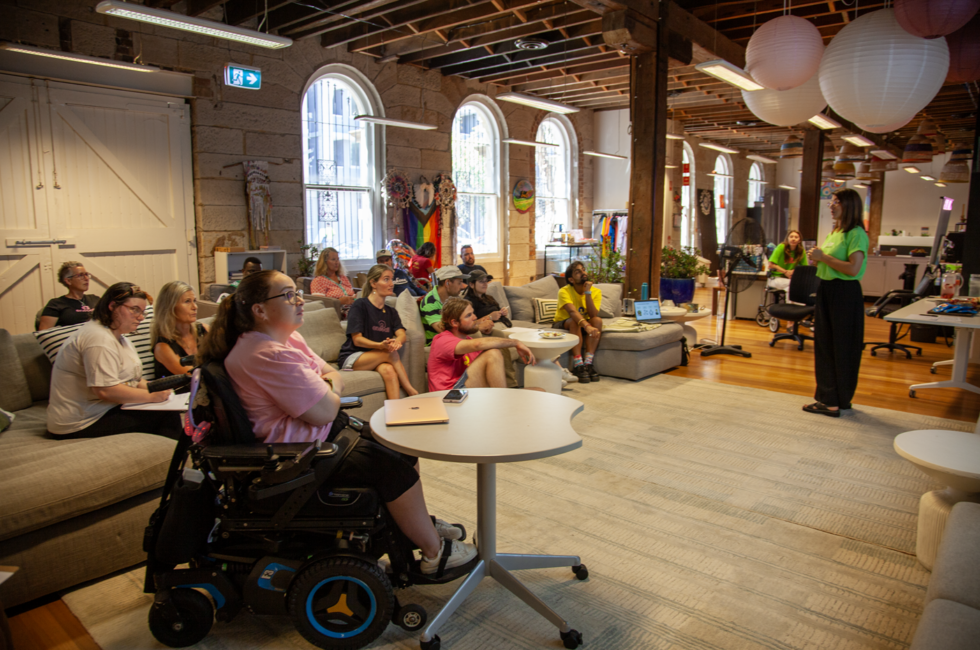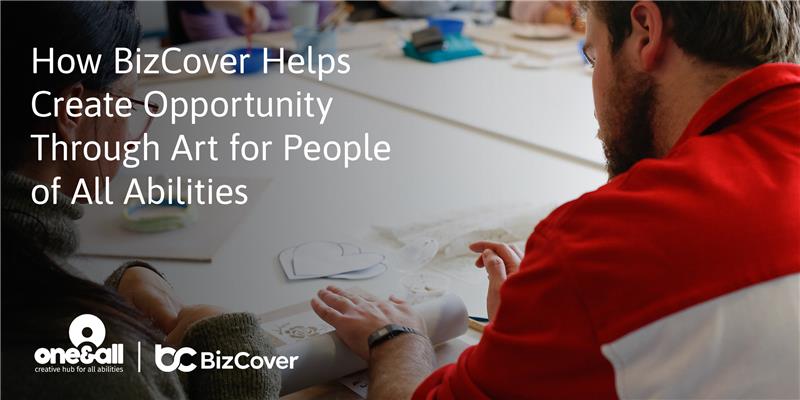Published on: February 20, 2025
6 min read
Exploring Entrepreneurship for People with Disability at One&All
Starting a business can be an extremely rewarding but challenging journey, especially for people with disability. But with the right resources, guidance and encouragement, those living with disability can be supported to turn a passion into a rewarding employment opportunity.
BizCover is a proud partner of One&All, a not-for-profit organisation that caters to people with disability. The One&All Hub, located in Sydney’s inner city, offers an inclusive space for people of various abilities to participate in workshops. The aim is to build skills, encourage socialisation and improve fitness, among other things.
Gordon Duff is the acting general manager at One&All. He believes that self-employment can help people living with disability in a multitude of ways.
“Often the case with people who are neurodiverse is that they have really substantial artistic talent, or a very strong focus on a particular thing,” says Gordon. “Turning that hobby or passion into a business idea can have a big impact on someone’s life.”

What kinds of barriers do people with disability face in the workforce?
Gordon has seen first-hand how many barriers to employment people with disability regularly face.
He says, “For people with more complex disability, their employment options are quite limited to low-level, menial, poorly paid work – often in very controlled environments.”
Some of the other challenges people with disability can face include:
- Workplace accessibility: A lack of accessibility options, such as ramps, elevators or accessible bathrooms, can be a barrier to people with disability.
- Inflexible infrastructure: People with disability often need a more flexible schedule to accommodate their disability. A strict work schedule or a lack of remote work options could hamper them.
- Employer attitudes and misconceptions: Some employers may still hold biases against people with disability, which could lead to a lack of growth opportunities.
- Limited support and awareness: Insufficient disability awareness training in the workplace could result in a lack of sensitivity and understanding from other employees. Workplace support programs may also be difficult to access.
People with disability thrive in self-employment
Data from the University of Technology in Sydney (UTS) found that people with disability have a higher rate of self-employment or entrepreneurship (13.1%) compared to the country’s average (9.2%). In fact, people with disability are, on average, 43% more likely to be self-employed than other Australians. People with psychosocial disability are 76% more likely to be self-employed than other Australians.
Self-employment can be a viable option for people living with disability. Not only can it provide them with an income stream that can help them become financially independent, but it can also provide a sense of fulfilment and accomplishment.
Exploring business ideas for those living with disability
One&All recently teamed up with IgniteAbility, a social enterprise that offers self-employment support for people with disability. IgniteAbility was invited to host a presentation at the One&All Hub on starting a business.
“There’s a gap for people with disability who want to pursue self-employment or a micro enterprise,” says Gordon. “So I reached out to IgniteAbility because there’s a really great connection between what [One&All does] and what IgniteAbility does.”
Aligning interests with business goals
As part of the IgniteAbility presentation, participants were encouraged to think about their hobbies, strengths and interests and how something could potentially be turned into a business idea.
It’s important to think about activities that a person is both naturally good at and enjoys doing. Aligning personal interests with the business concept can help to provide someone with work that is fulfilling, rewarding and interesting. In turn, this can help to fuel motivation and resilience when challenges arise.
Creating a business plan on a page
A business plan does not have to be overly long or complicated. Starting with a simple “business plan on a page” can help to organise ideas and set clear, achievable goals. This can include a few basic points, such as:
- The business idea: What is the product or service I’m offering?
- The target market: Who am I selling my product or service to?
- Pricing and costs: What expenses will I have, and how will this impact the way I price my products or services?
- Marketing strategy: How will I reach my potential customers?
Starting a micro business vs. small business
A micro business is a type of business that generally has little start-up capital and minimal overheads. This could be something as simple as a homemade candle business, managed and operated by a single person from their own home.
Starting a micro business can be a viable option for people living with disability because it generally requires less capital and investment to start and continue running. According to the UTS report, people with disability often face issues in obtaining start-up funding or loans. This is quite a different experience to other entrepreneurs.

Support and resources for aspiring business owners
Gordon Duff explains that it can be difficult for people with disability to join the mainstream workforce because they can have vastly different needs to other people.
Generally speaking, business programs or mainstream work can be very structured, which does not always work for people with disability. Depending on the type of disability they’re living with, people may need to take a break for a period of time and then recommence – which is not always possible in mainstream schooling or work.
That’s why Gordon wants to help people with disability find empowerment and independence through self-employment.
“If somebody comes to the One&All Hub and then, through their engagement with the programs, they could discover that they either have a talent or an interest in something, such as cooking,” says Gordon. “If there was nowhere for them to take that interest and develop a business idea, it would only ever stay a hobby.”
Gordon continues, “What we’re trying to do here is help activate citizenship of people with disability by thinking about how they can turn a hobby into a business. This gives them more choice around their employment.”
Insurance for entrepreneurs
Starting a business and navigating the world of business insurance can be challenging and time-consuming. That’s why BizCover has made it easy for business owners to compare and buy insurance online. In just a couple of minutes, you can compare quotes from Australia’s leading insurance providers and select the policies that suit your business.
For on the go cover, go BizCover.
© 2025 BizCover Pty Limited, all rights reserved. ABN 68 127 707 975; AFSL 501769
This information is general only and does not take into account your objectives, financial situation or needs. It should not be relied upon as advice. As with any insurance, cover will be subject to the terms, conditions and exclusions contained in the policy wording or Product Disclosure Statement (available on our website). Please consider whether the advice is suitable for you before proceeding with any purchase. Target Market Determination document is also available (as applicable). © 2025 BizCover Pty Limited, all rights reserved. ABN 68 127 707 975; AFSL 501769.



![[Press Release] Vero Business Pack now available through BizCover](https://bizcover.com.au/wp-content/uploads/vero-offers-business-pack-bizcover.png)